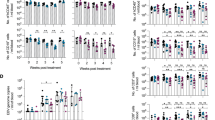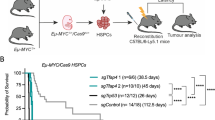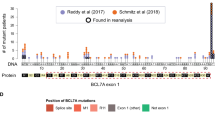Abstract
Loss of MHC class II expression in B-cell lymphoma has been associated with a higher tumorigenicity resulting from lower titers of tumor-infiltrating lymphocytes. This report aims towards the identification of the molecular mechanism leading to defective MHC class II expression in a B-cell lymphoma cell line, Rec-1. We evidenced a coordinated alteration of HLA-D gene transcription, reminiscent of B lymphoblastoid cell lines from patients with MHC class II deficiency. Genetic complementation performed between these cell lines and the lymphoma cells indicated that Rec-1 is altered in the MHC2TA gene. MHC2TA encodes the class II transactivator (CIITA), the master regulator of HLA-D gene expression. However, the coding sequence of the Rec-1 CIITA transcript did not reveal any mutation that could hamper the activity of the encoded protein. In agreement with the genetic complementation analysis, we evidenced a highly residual CIITA protein expression in the Rec-1 cell line resulting from a transcriptional defect affecting MHC2TA expression. Anti-HLA-DR monoclonal antibody treatment has proved efficient in the destruction of B lymphoma cells. Our data indicate that the appearance of variants losing CIITA, and thereby HLA-DR, expression will require a thorough monitoring during such immunotherapy protocols.
This is a preview of subscription content, access via your institution
Access options
Subscribe to this journal
Receive 12 print issues and online access
$259.00 per year
only $21.58 per issue
Buy this article
- Purchase on Springer Link
- Instant access to full article PDF
Prices may be subject to local taxes which are calculated during checkout






Similar content being viewed by others
References
Germain RN . MHC-dependent antigen processing and peptide presentation: providing ligands for T lymphocyte activation. Cell 1994; 76: 287–299.
Glimcher LH, Kara CJ . Sequences and factors: a guide to MHC class II transcription. Ann Rev Immunol 1992; 10: 13–50.
Reith W, Muhlethaler-Mottet A, Masternak K, Villard J, Mach B . The molecular basis of MHC class II deficiency and transcriptional control of MHC class II gene expression. Microbes Infect 1999; 1: 839–846.
Reith W, Mach B . The bare lymphocyte syndrome and the regulation of MHC expression. Annu Rev Immunol 2001; 19: 331–373.
Harton JA, Ting JP . Class II transactivator: mastering the art of major histocompatibility complex expression. Mol Cell Biol 2000; 20: 6185–6194.
Steimle V, Otten LA, Zufferey M, Mach B . Complementation cloning of an MHC class II transactivator mutated in hereditary MHC class II deficiency (or bare lymphocyte syndrome). Cell 1993; 75: 135–146.
Zhu XS, Linhoff MW, Li G, Chin KC, Maity SN, Ting JP . Transcriptional scaffold: CIITA interacts with NF-Y, RFX, and CREB To cause stereospecific regulation of the class II major histocompatibility complex promoter. Mol Cell Biol 2000; 20: 6051–6061.
Kretsovali A, Agalioti T, Spilianakis C, Tzortzakaki E, Merika M, Papamatheakis J . Involvement of CREB binding protein in expression of major histocompatibility complex class II genes via interaction with the class II transactivator. Mol Cell Biol 1998; 18: 6777–6783.
Spilianakis C, Papamatheakis J, Kretsovali A . Acetylation by PCAF enhances CIITA nuclear accumulation and transactivation of major histocompatibility complex class II genes. Mol Cell Biol 2000; 20: 8489–8498.
Fontes JD, Jiang B, Peterlin BM . The class II trans-activator CIITA interacts with the TBP-associated factor TAFII32. Nucleic Acids Res 1997; 25: 2522–2528.
Mahanta SK, Scholl T, Yang FC, Strominger JL . Transactivation by CIITA, the type II bare lymphocyte syndrome- associated factor, requires participation of multiple regions of the TATA box binding protein. Proc Natl Acad Sci USA 1997; 94: 6324–6329.
Steimle V, Siegrist CA, Mottet A, Lisowska-Grospierre B, Mach B . Regulation of MHC class II expression by interferon-gamma mediated by the transactivator gene CIITA. Science 1994; 265: 106–109.
Chang CH, Fontes JD, Peterlin M, Flavell RA . Class II transactivator (CIITA) is sufficient for the inducible expression of major histocompatibility complex class II genes. J Exp Med 1994; 180: 1367–1374.
Muhlethaler-Mottet A, Otten LA, Steimle V, Mach B . Expression of MHC class II molecules in different cellular and functional compartments is controlled by differential usage of multiple promoters of the transactivator CIITA. EMBO J 1997; 16: 2851–2860.
Lennon AM, Ottone C, Rigaud G, Deaven LL, Longmire J, Fellous M et al. Isolation of a B-cell-specific promoter for the human class II transactivator. Immunogenetics 1997; 45: 266–273.
Barbieri G, Deffrennes V, Prod'homme T, Vedrenne J, Baton F, Cortes C et al. Isoforms of the class II transactivator protein. Int Immunol 2002; 14: 839–848.
Nickerson K, Sisk TJ, Inohara N, Yee CS, Kennell J, Cho MC et al. Dendritic cell-specific MHC class II transactivator contains a caspase recruitment domain that confers potent transactivation activity. J Biol Chem 2001; 276: 19089–19093.
Griscelli C, Lisowska-Grospierre B, Mach B . Combined immunodeficiency with defective expression in MHC class II genes. Immunodeficiency Rev 1989; 1: 135–143.
Benichou B, Strominger JL et al. Class II-antigen-negative patient and mutant B-cell lines represent at least three, and probably four, distinct genetic defects defined by complementation analysis. Proc Natl Acad Sci USA 1991; 88: 4285–4288.
Masternak K, Barras E, Zufferey M, Conrad B, Corthals G, Aebersold R et al. A gene encoding a novel RFX-associated transactivator is mutated in the majority of MHC class II deficiency patients. Nat Genet 1998; 20: 273–277.
Steimle V, Durand B, Barras E, Zufferey M, Hadam MR, Mach B et al. A novel DNA-binding regulatory factor is mutated in primary MHC class II deficiency (bare lymphocyte syndrome). Genes Dev 1995; 9: 1021–1032.
Durand B, Sperisen P, Emery P, Barras E, Zufferey M, Mach B et al. RFXAP, a novel subunit of the RFX DNA binding complex is mutated in MHC class II deficiency. EMBO J. 1997; 16: 1045–1055.
Dziembowska M, Fondaneche MC, Vedrenne J, Barbieri G, Wiszniewski W, Picard C et al. Three novel mutations of the CIITA gene in MHC class II-deficient patients with a severe immunodeficiency. Immunogenetics 2002; 53: 821–829.
Yazawa T, Kamma H, Fujiwara M, Matsui M, Horiguchi H, Satoh H et al. Lack of class II transactivator causes severe deficiency of HLA-DR expression in small cell lung cancer. J Pathol 1999; 187: 191–199.
Magner WJ, Kazim AL, Stewart C, Romano MA, Catalano G, Grande C et al. Activation of MHC class I, II, and CD40 gene expression by histone deacetylase inhibitors. J Immunol 2000; 165: 7017–7024.
Lu Y, Tschickardt ME, Schmidt BJ, Blanck G . IFN-gamma inducibility of class II transactivator is specifically lacking in human tumour lines: relevance to retinoblastoma protein rescue of IFN-gamma inducibility of the HLA class II genes. Immunol Cell Biol 1997; 75: 325–332.
Xi H, Blanck G . Interferon regulatory factor-2 point mutations in human pancreatic tumors. Int J Cancer 2000; 87: 803–808.
Naves R, Lennon AM, Barbieri G, Reyes L, Puga G, Salas L et al. MHC class II-deficient tumor cell lines with a defective expression of the class II transactivator. Int Immunol 2002; 14: 481–491.
Morris AC, Spangler WE, Boss JM . Methylation of class II trans-activator promoter IV: a novel mechanism of MHC class II gene control. J Immunol 2000; 164: 4143–4149.
Stopeck AT, Gessner A, Miller TP, Hersh EM, Johnson CS, Cui H et al. Loss of B7.2 (CD86) and intracellular adhesion molecule 1 (CD54) expression is associated with decreased tumor-infiltrating T lymphocytes in diffuse B-cell large-cell lymphoma. Clin Cancer Res 2000; 6: 3904–3909.
Amiot L, Onno M, Lamy T, Dauriac C, Le Prise PY, Fauchet R et al. Loss of HLA molecules in B lymphomas is associated with an aggressive clinical course. Br J Haematol 1998; 100: 655–663.
Fuji H, Iribe H . Clonal variation in tumorigenicity of L1210 lymphoma cells: nontumorigenic variants with an enhanced expression of tumor-associated antigen and Ia antigens. Cancer Res 1986; 46: 5541–5547.
Coiffier B, Gisselbrecht C, Herbrecht R, Tilly H, Bosly A, Brousse N . LNH-84 regimen: a multicenter study of intensive chemotherapy in 737 patients with aggressive malignant lymphoma. J Clin Oncol 1989; 7: 1018–1026.
Meeker TC, Sellers W, Harvey R, Withers D, Carey K, Xiao H et al. Cloning of the t(11;14)(q13;q32) translocation breakpoints from two human leukemia cell lines. Leukemia 1991; 5: 733–737.
Brown JA, He XF, Westerheide SD, Boss JM . Characterization of the expressed CIITA allele in the class II MHC transcriptional mutant RJ2.2.5. Immunogenetics 1996; 43: 88–91.
Lisowska-Grospierre B, Fondaneche M-C, Rois M-P, Griscelli C, Fischer A . Two complementation groups account for most cases in inherited MHC class II deficiency. Hum Mol Genet 1994; 3: 953–958.
Watson AJ, DeMars R, Trowbridge IS, Bach FH . Detection of a novel human class II HLA antigen. Nature 1983; 304: 358–361.
Lennon A, Ottone C, Peijnenburg A, Hamon-Benais C, Colland F, Gobin S et al. The RAG cell line defines a new complementation group of MHC class II deficiency. Immunogenetics 1996; 43: 352–359.
Zhou H, Su HS, Zhang X, Douhan III J, Glimcher LH . CIITA-dependent and -independent class II MHC expression revealed by a dominant negative mutant. J Immunol 1997; 158: 4741–4749.
Klein C, Lisowska-Grospierre B, LeDeist F, Fischer A, Griscelli C . Major histocompatibility complex class II deficiency: clinical manifestations, immunologic features, and outcome. J Pediatr 1993; 123: 921–929.
Piskurich JF, Lin KI, Lin Y, Wang Y, Ting JP, Calame K . BLIMP-I mediates extinction of major histocompatibility class II transactivator expression in plasma cells. Nat Immunol 2000; 1: 526–532.
Riley JL, Westerheide SD, Price JA, Brown JA, Boss JM . Activation of class II MHC genes requires both the X box region and the class II transactivator (CIITA). Immunity 1995; 2: 533–543.
Peijnenburg A, Van den Berg R, Van Eggermond MJ, Sanal O, Vossen JM, Lennon AM et al. Defective MHC class II expression in an MHC class II deficiency patient is caused by a novel deletion of a splice donor site in the MHC class II transactivator gene. Immunogenetics 2000; 51: 42–49.
Nagarajan UM, Bushey A, Boss JM . Modulation of gene expression by the MHC class II transactivator. J Immunol 2002; 169: 5078–5088.
Wakasugi K, Slike BM, Hood J, Ewalt KL, Cheresh DA, Schimmel P . Induction of angiogenesis by a fragment of human tyrosyl-tRNA synthetase. J Biol Chem 2002; 277: 20124–20136.
Choy L, Derynck R . The type II transforming growth factor (TGF)-beta receptor-interacting protein TRIP-1 acts as a modulator of the TGF-beta response. J Biol Chem. 1998; 273: 31455–31462.
Murphy SP, Holtz R, Lewandowski N, Tomasi TB, Fuji H . DNA Alkylating agents alleviate silencing of class II transactivator gene expression in L1210 lymphoma cells. J Immunol 2002; 169: 3085–3093.
Wiszniewski W, Fondaneche MC, Le Deist F, Kanariou M, Selz F, Brousse N et al. Mutation in the class II trans-activator leading to a mild immunodeficiency. J Immunol 2001; 167: 1787–1794.
Otten LA, Steimle V, Bontron S, Mach B . Quantitative control of MHC class II expression by the transactivator CIITA. Eur J Immunol 1998; 28: 473–478.
Otten LA, Tacchini-Cottier F, Lohoff M, Annunziato F, Cosmi L, Scarpellino L et al. Deregulated MHC class II transactivator expression leads to a strong Th2 bias in CD4+ T lymphocytes. J Immunol 2003; 170: 1150–1157.
Zhu XS, Ting JP . A 36-amino-acid region of CIITA is an effective inhibitor of CBP: novel mechanism of gamma interferon-mediated suppression of collagen alpha(2)(I) and other promoters. Mol Cell Biol 2001; 21: 7078–7088.
Chan HM, La Thangue NB . p300/CBP proteins: HATs for transcriptional bridges and scaffolds. J Cell Sci 2001; 114: 2363–2373.
Gobin SJ, Peijnenburg A, van Eggermond M, van Zutphen M, van den Berg R, van den Elsen PJ . The RFX complex is crucial for the constitutive and CIITA-mediated transactivation of MHC class I and beta2-microglobulin genes. Immunity 1998; 9: 531–541.
Chiari R, Hames G, Stroobant V, Texier C, Maillere B, Boon T et al. Identification of a tumor-specific shared antigen derived from an Eph receptor and presented to CD4 T cells on HLA class II molecules. Cancer Res 2000; 60: 4855–4863.
Drenou B, Blancheteau V, Burgess DH, Fauchet R, Charron DJ, Mooney NA . A caspase-independent pathway of MHC class II antigen-mediated apoptosis of human B lymphocytes. J Immunol 1999; 163: 4115–4124.
Dechant M, Bruenke J, Valerius T . HLA class II antibodies in the treatment of hematologic malignancies. Semin Oncol 2003; 30: 465–475.
Nagy ZA, Hubner B, Lohning C, Rauchenberger R, Reiffert S, Thomassen-Wolf E et al. Fully human, HLA-DR-specific monoclonal antibodies efficiently induce programmed death of malignant lymphoid cells. Nat Med 2002; 8: 801–807.
Kosmas C, Stamatopoulos K, Stavroyianni N, Tsavaris N, Papadaki T . Anti-CD20-based therapy of B cell lymphoma: state of the art. Leukemia 2002; 16: 2004–2015.
Foran JM, Norton AJ, Micallef IN, Taussig DC, Amess JA, Rohatiner AZ et al. Loss of CD20 expression following treatment with rituximab (chimaeric monoclonal anti-CD20): a retrospective cohort analysis. Br J Haematol 2001; 114: 881–883.
Boye J, Elter T, Engert A . An overview of the current clinical use of the anti-CD20 monoclonal antibody rituximab. Ann Oncol 2003; 14: 520–535.
Acknowledgements
We thank Mrs Céline Pangault for her technical help in the lymphoma phenotyping. This work was supported in part by the Association pour la Recherche sur le Cancer and the Fondation de France. TP was supported by grants from the Association pour la Recherche sur le Cancer and the Fondation pour la Recherche Médicale. GB was supported by grants from the Fondation de France and the INSERM.
Author information
Authors and Affiliations
Corresponding author
Rights and permissions
About this article
Cite this article
Prod'homme, T., Drénou, B., De Ruyffelaere, C. et al. Defective class II transactivator expression in a B lymphoma cell line. Leukemia 18, 832–840 (2004). https://doi.org/10.1038/sj.leu.2403315
Received:
Accepted:
Published:
Issue Date:
DOI: https://doi.org/10.1038/sj.leu.2403315



